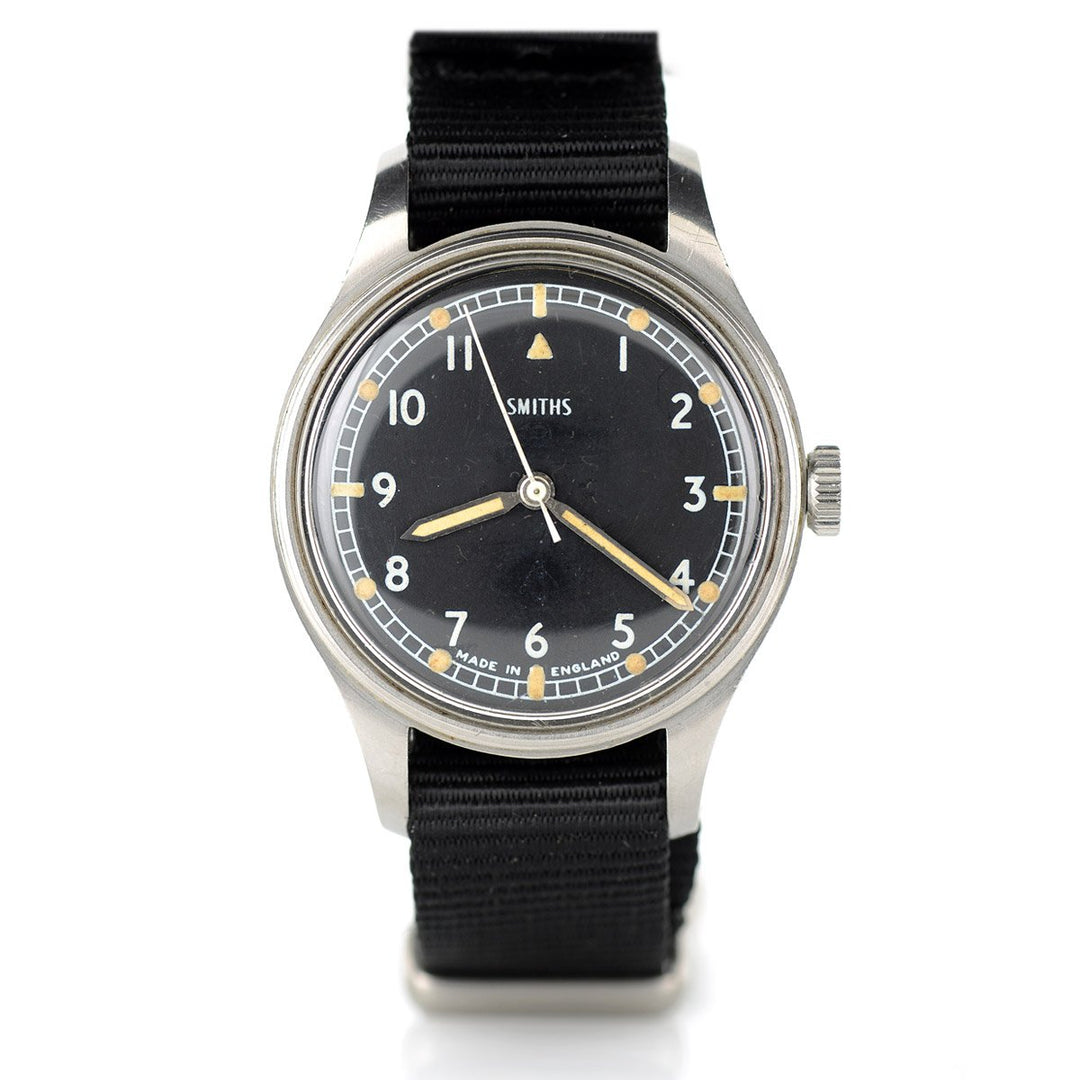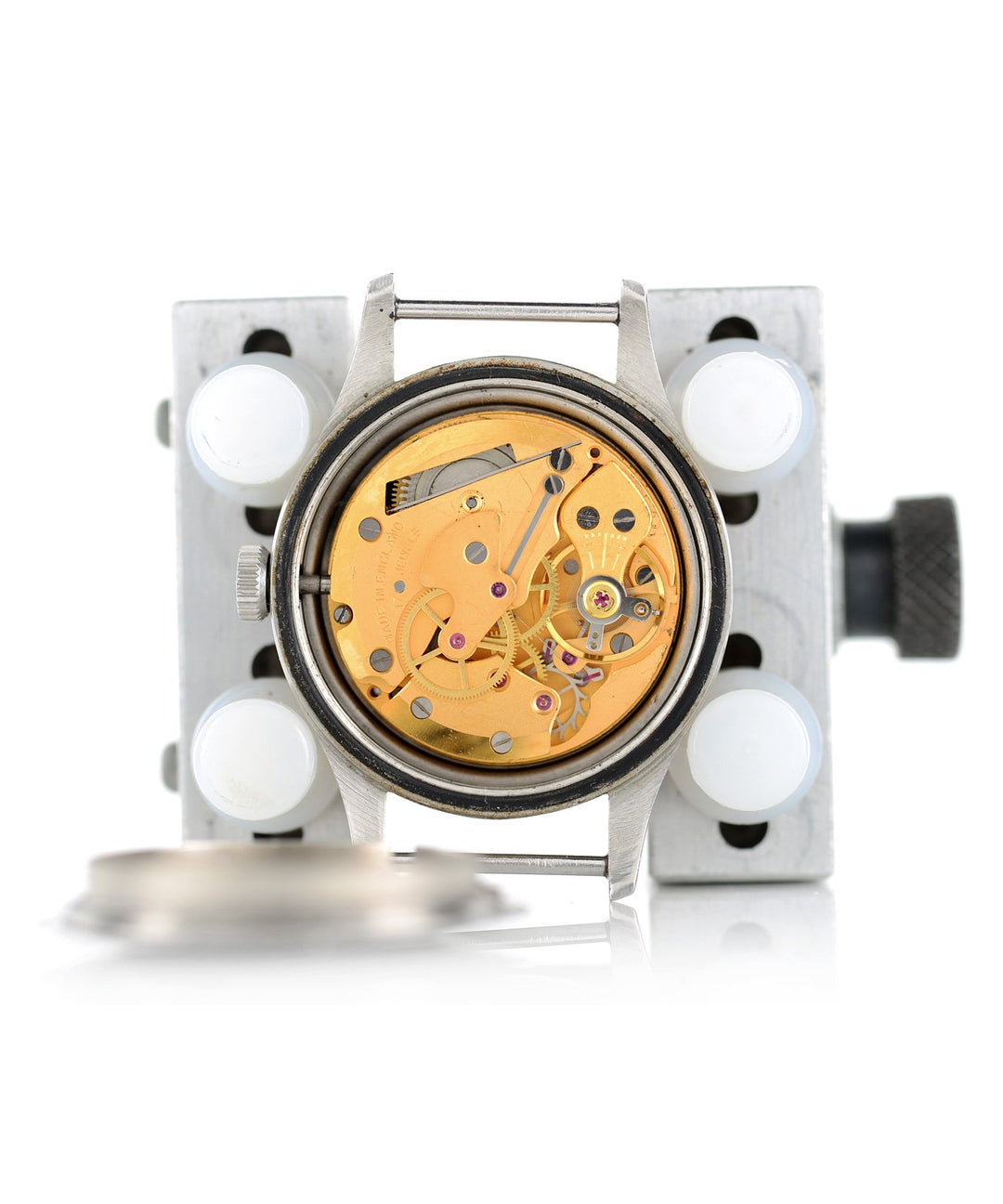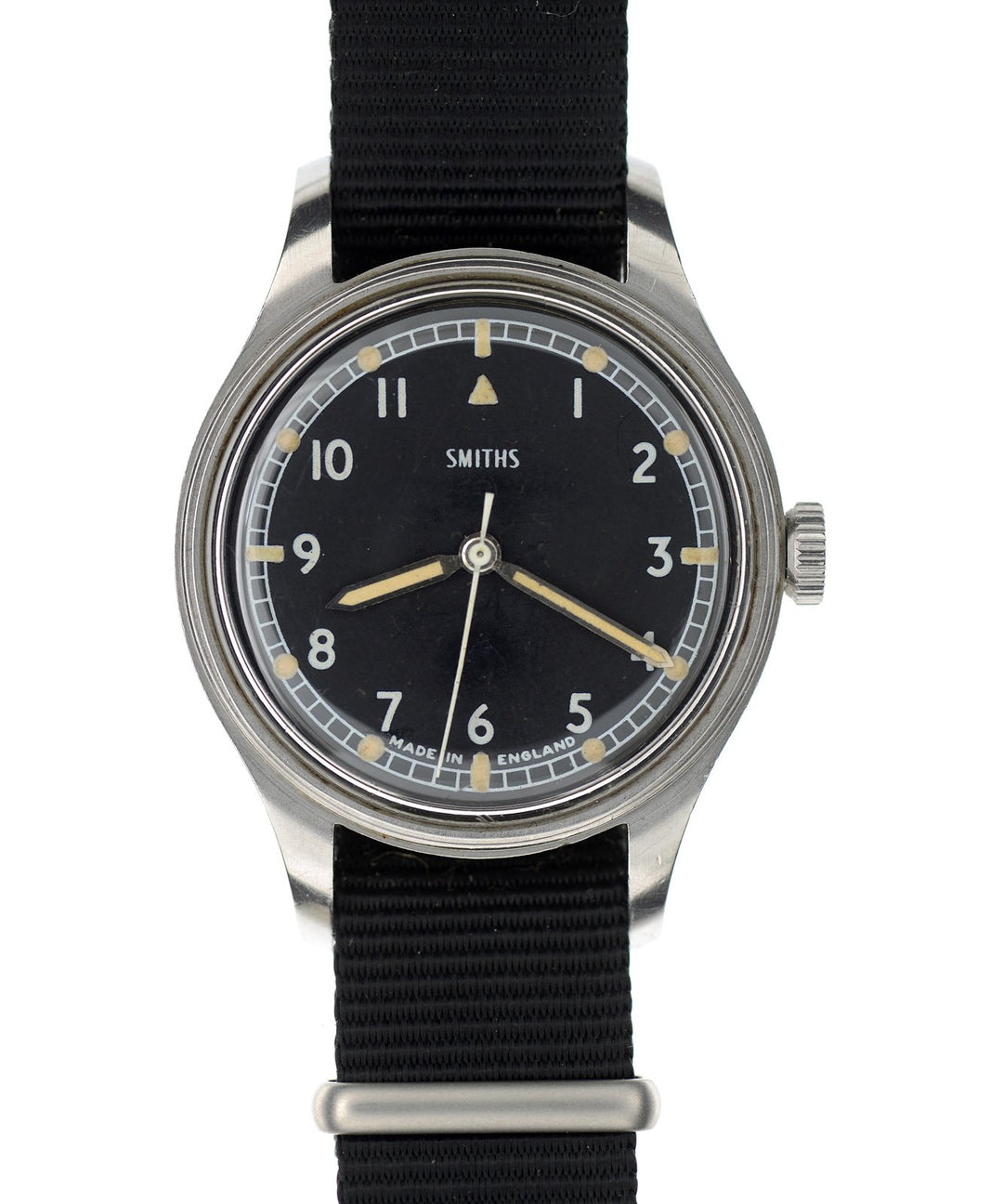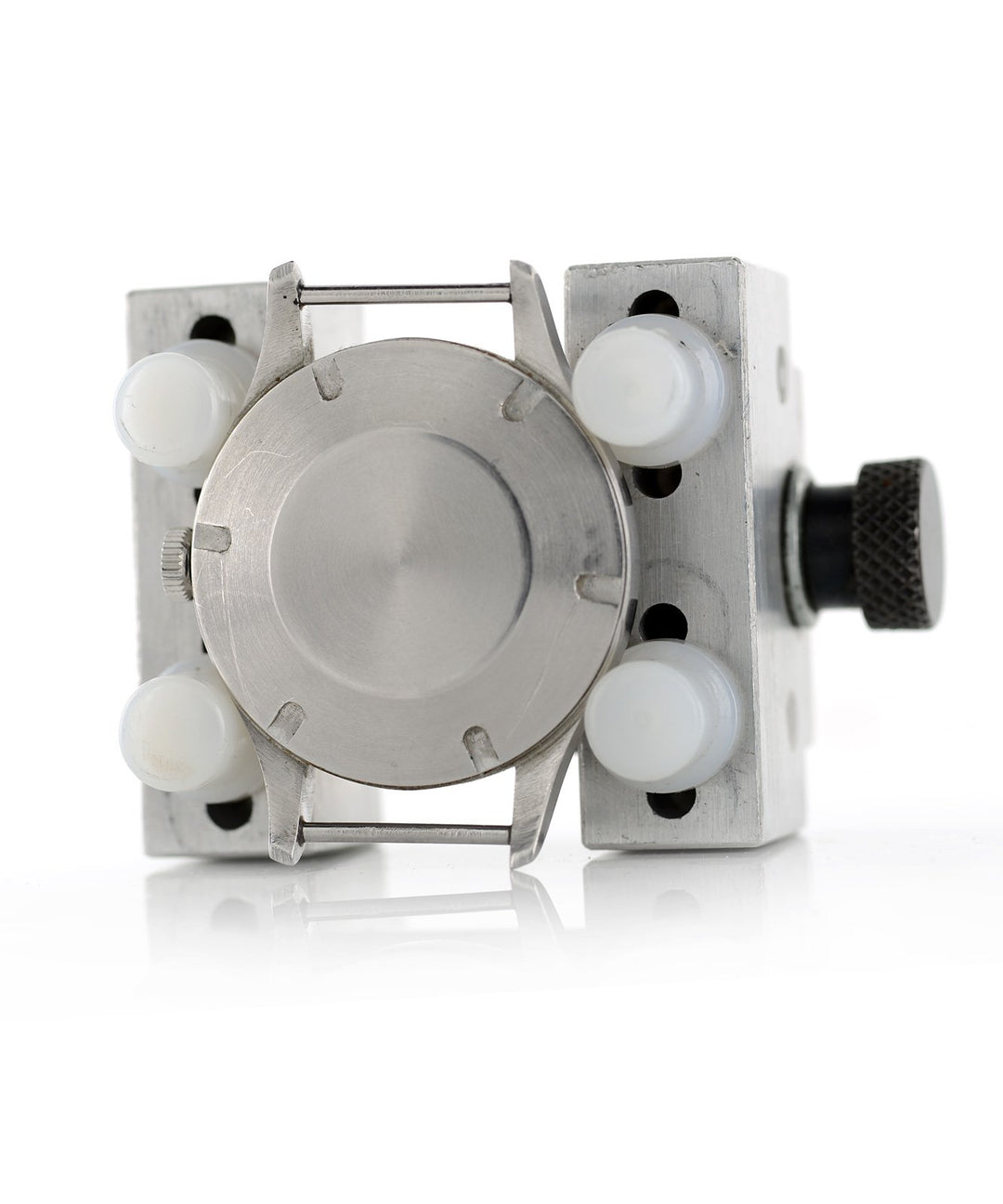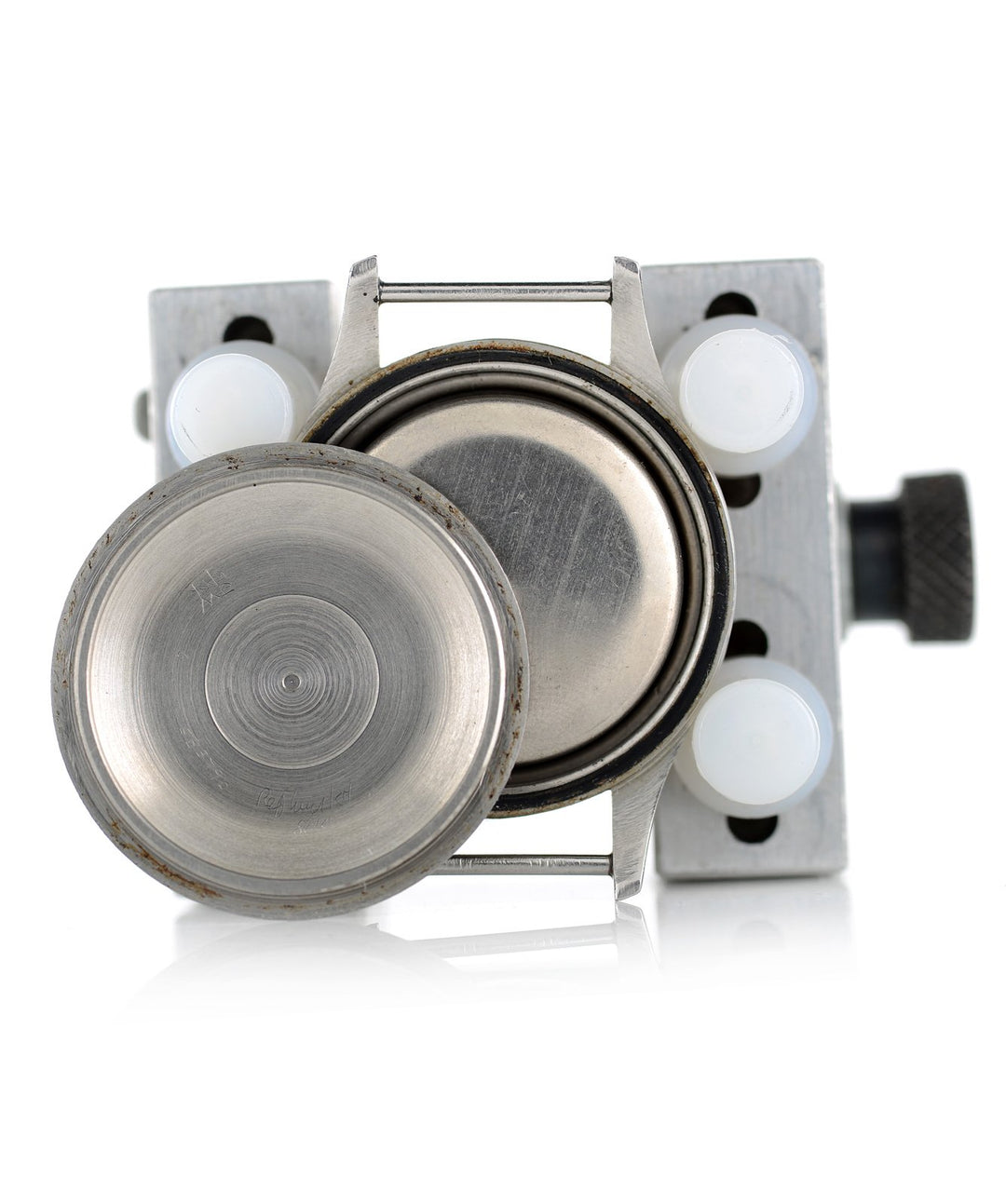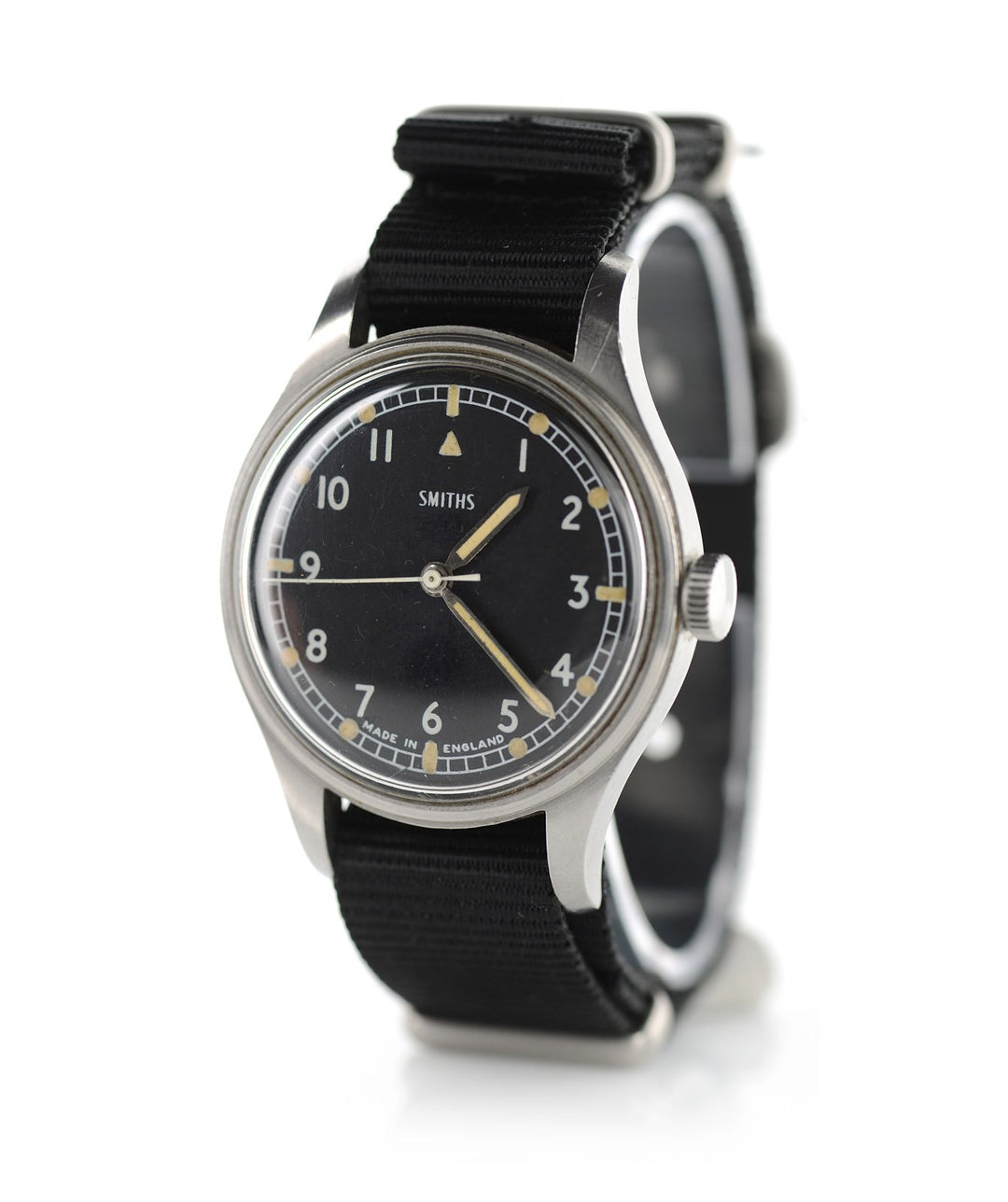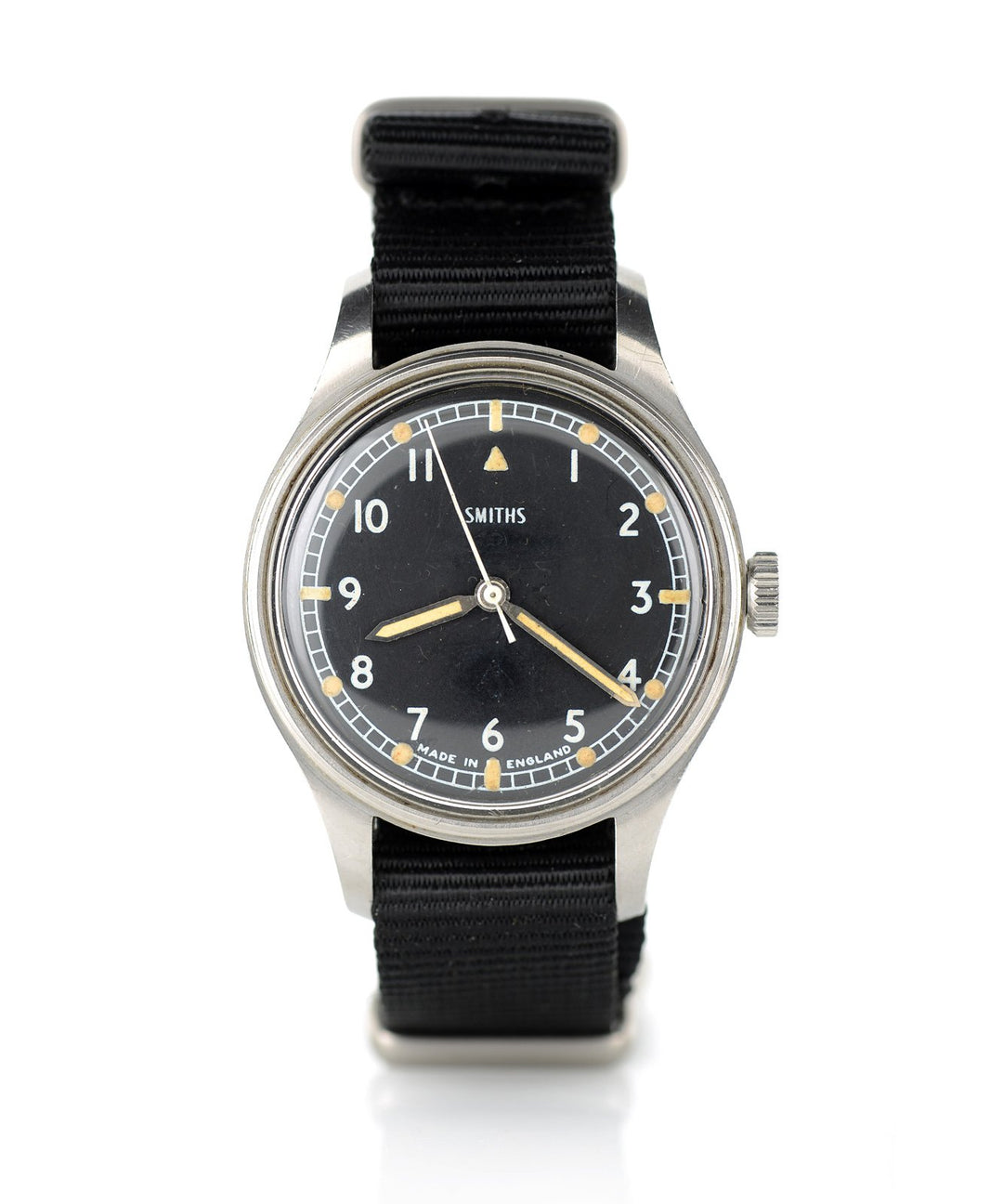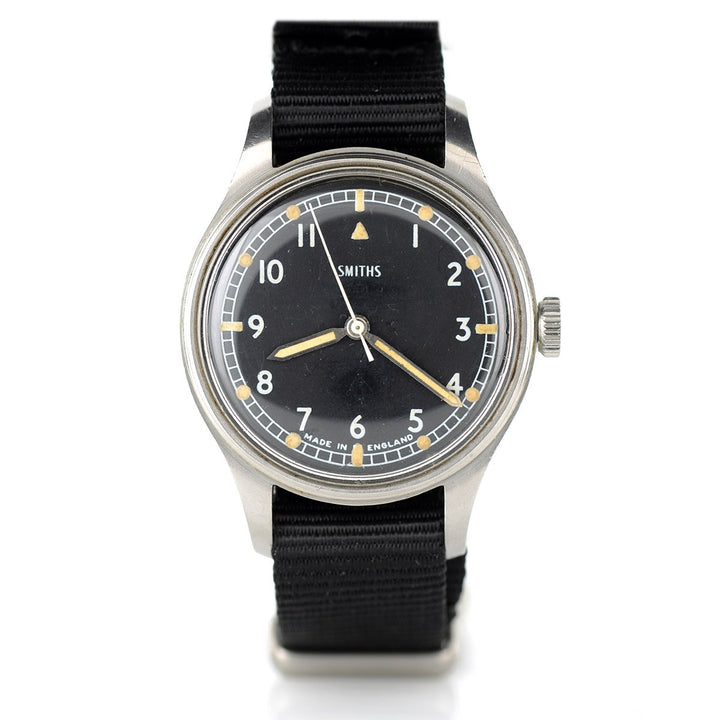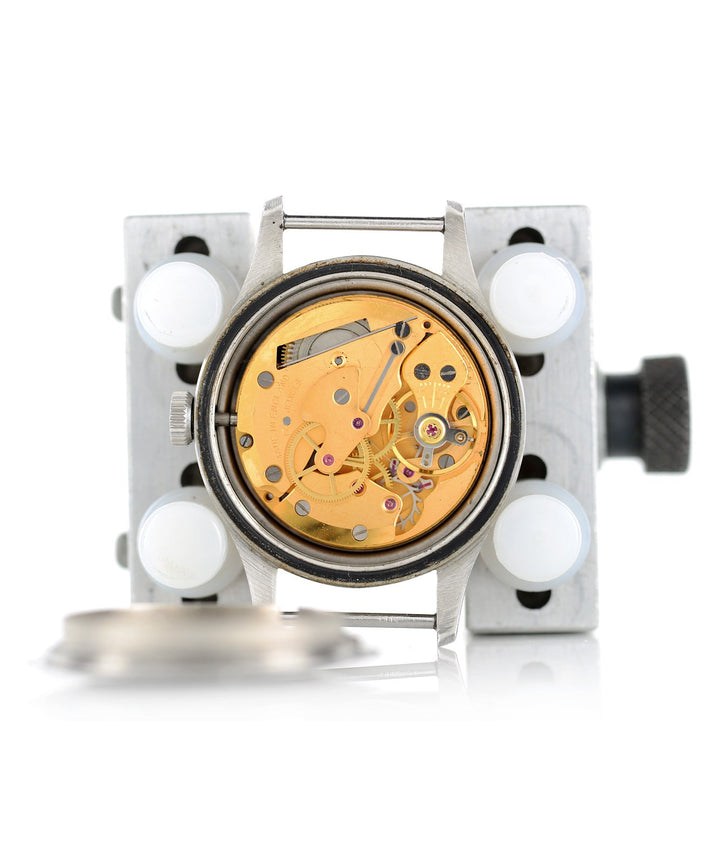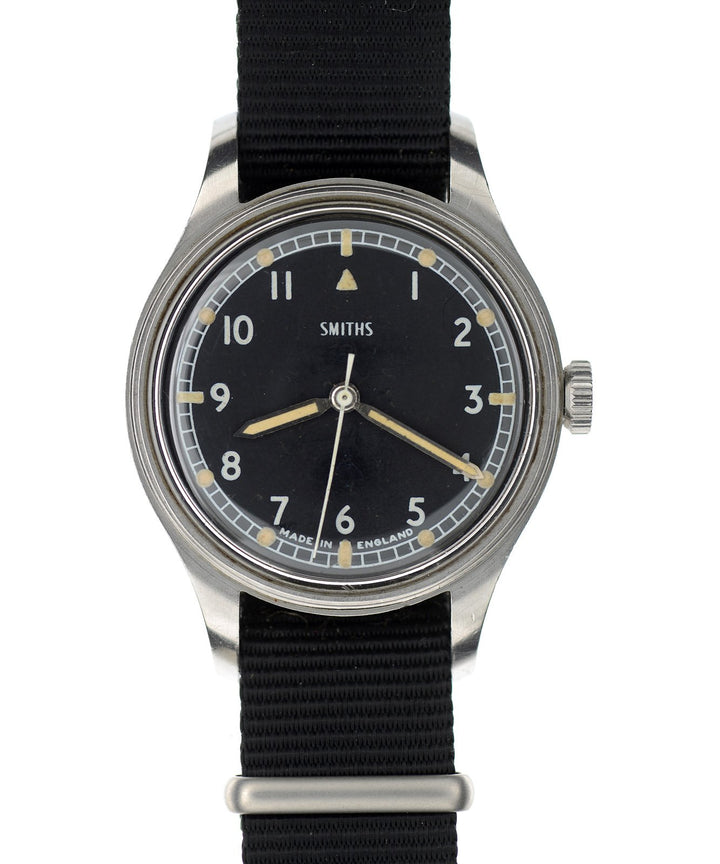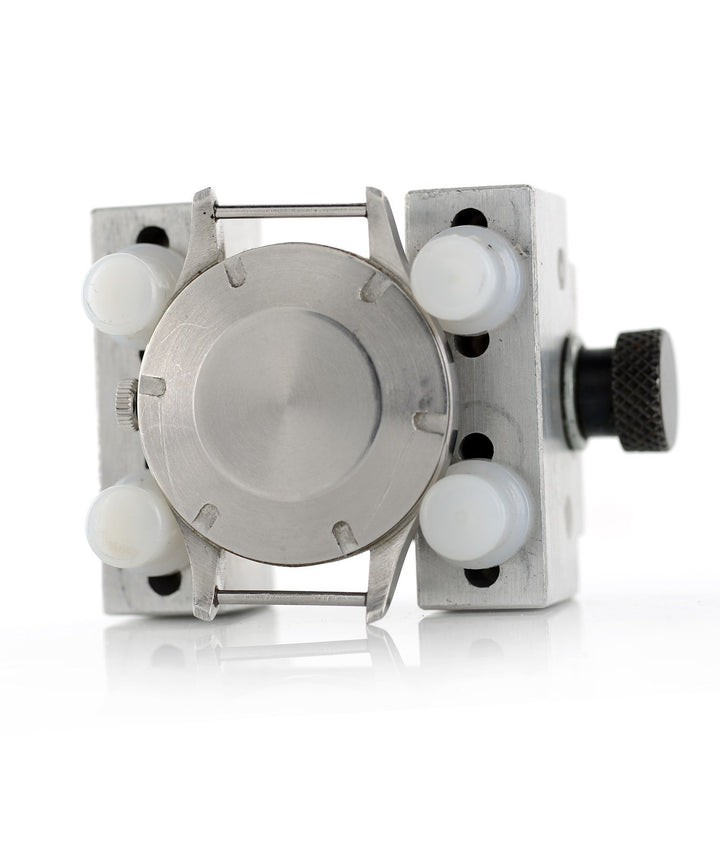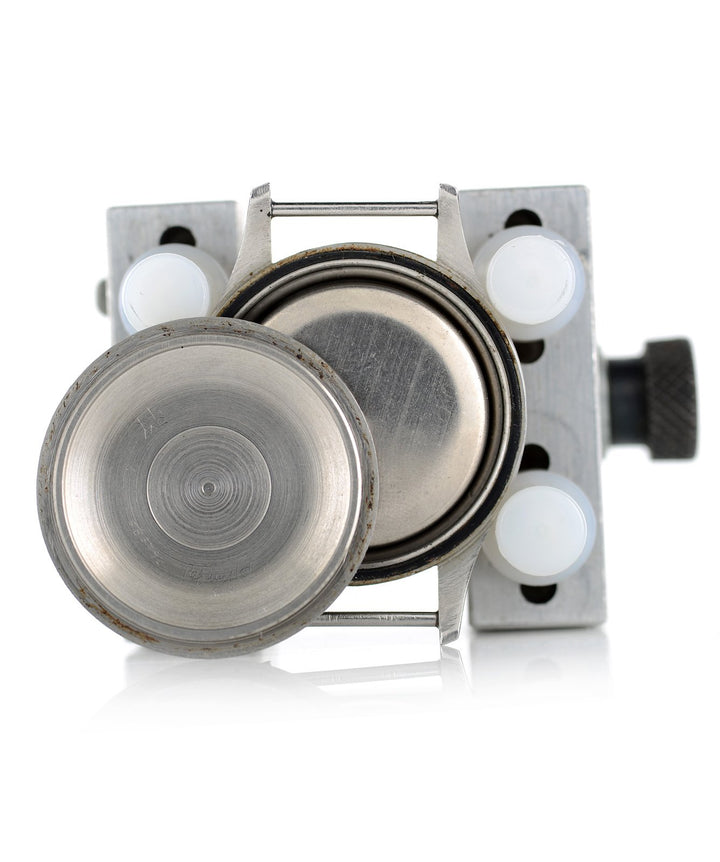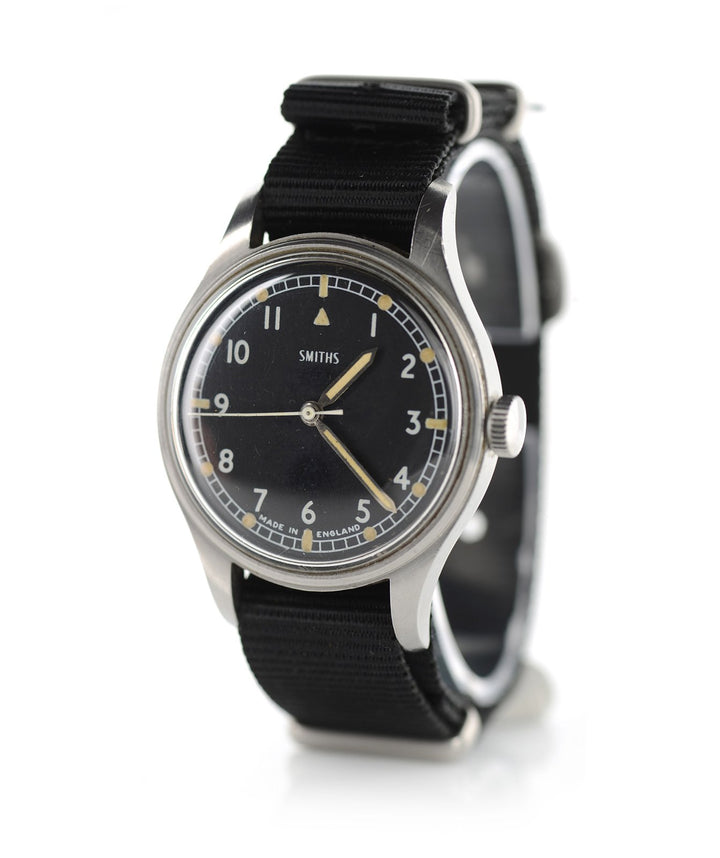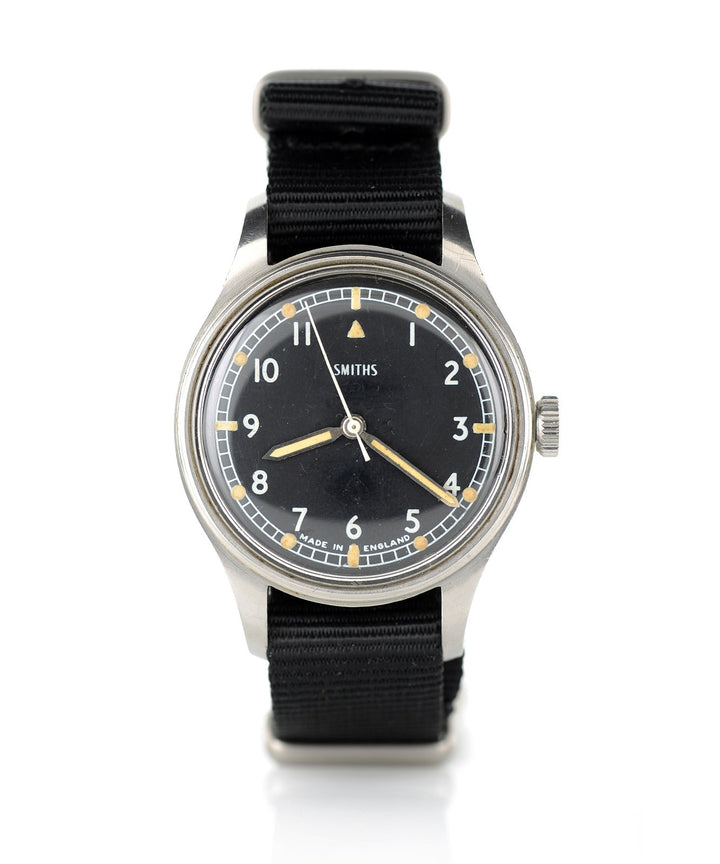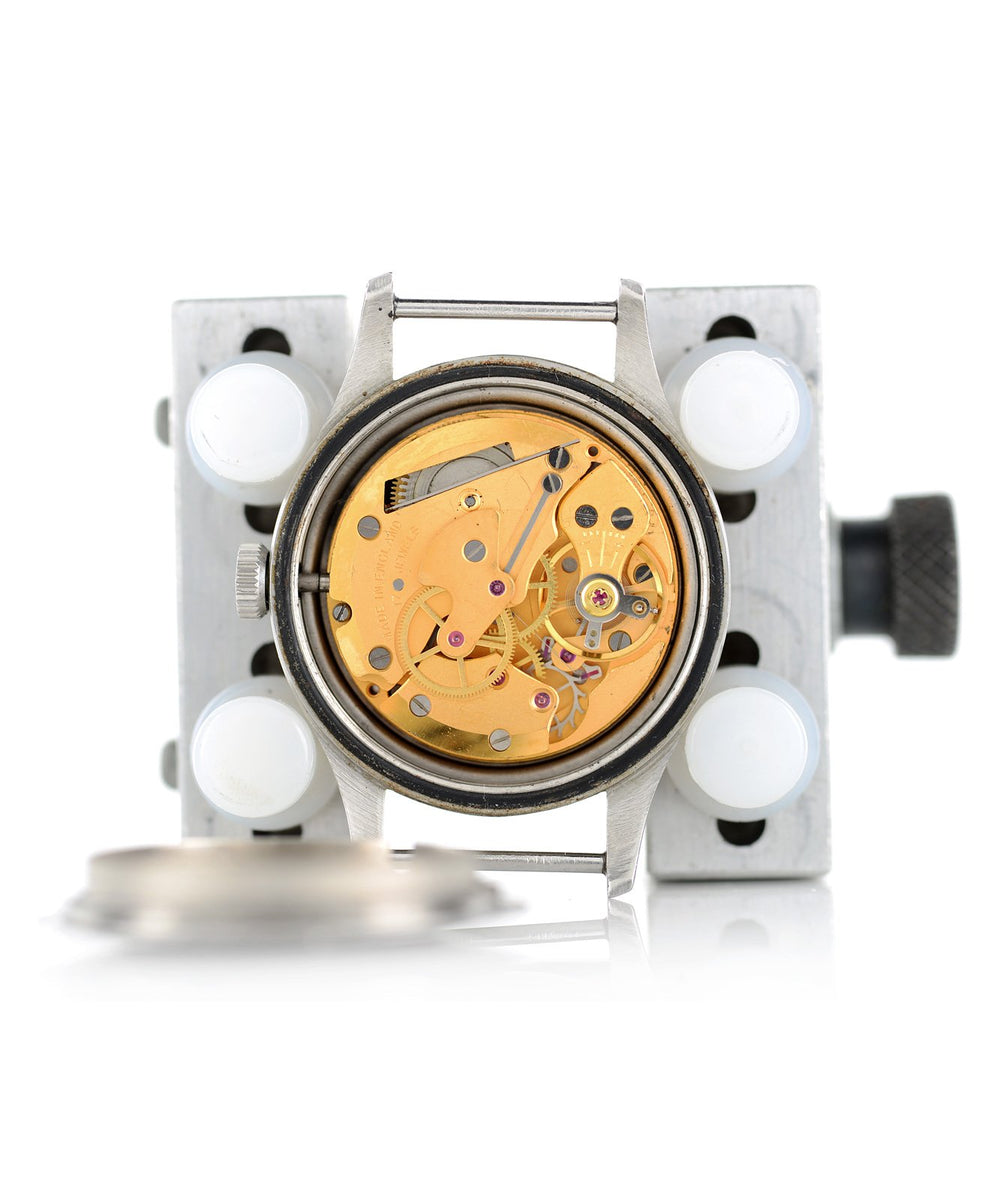Smiths W10 civilian issue
Smiths W10 civilian issue
Regular price
€1,400.00
€1,400.00
/
-
-
- In stock, ready to ship
- Backordered, shipping soon
This is a Smiths W10 watch, but one that was retailed to the public
rather than supplied to the British Army. In order to make this a
civilian issue, Smiths have covered the military pheon on the dial
(although the trace of can still be seem when viewing the dial from an
angle). These are really rather rare, indeed only a tiny fraction of the
number that were supplied to the military were sold to the public.
The watch was part of a contract that Smiths won to supply the army with a General Service watch, they supplied the watches for the years from 1967 - 1970. The watch has an all stainless steel case and the movement inside is protected from magnetic fields by an iron dial and an iron dust cover which sits inside the case back. The movement of the watch is Smiths 27.CS which has and additional feature: a device to stop the mechanism when the winding crown is pulled out, this allows the movement to be accurately set to a reference time source and was part of the original military specification.
The dial conforms to military specification - that is having a dark base colour and large, legible numerals in white, along with a minute / seconds track. The watch dial and hands had a luminous compound to allow them to be read in the dark, although this is almost completely exhausted now.
The time keeping on these military watches is far better than the majority of Smith’s production, showing that they could certainly match the best of the Swiss industry. It makes it all the sadder that the firm wound up the watch and clock making divisions only a few years later.
The stainless steel case is a good everyday size at 35mm and is in excellent condition, indeed the whole watch shows little sign of having been worn. The movement has been fully serviced and the timekeeping is excellent. The case has been ultrasonically cleaned, but as with all out vintage watches we have not done any further work on it. The watch has been fitted with a new nato military strap and it comes with our standard 12 month guarantee.
Case diameter: 35mm
Case material: stainless steel
Strap width: 17mm
time keeping: grade A
Smiths watches
Smiths were the last English producers of quality watches. Their watches aren't very well known today because it's over 30 years since they stopped production, but the quality of their watches bears comparison with anything the Swiss were producing. Smiths produced a variety of styles of watch for both ladies and gentlemen in chrome, steel, silver and gold cases. The gold cased watches were particularly popular as long-service presentation gifts and the casebacks are often engraved with a presentation inscription. We don't remove these inscriptions as we feel they are an important part of the story of each watch. They developed an automatic movement watch and also were contracted by the British army to produce a wristwatch for general service use (the automatic and the military Smiths are amongst the most sought after and command high prices).
These days we associate the Swiss with high end mechanical watches, but in the 19th century it was English watches that occupied this prestigious position. The Swiss began to compete with the English watchmakers by producing low cost watches. The English were slow to adapt to this new competitor, they took great pride in the relatively small volume of high-quality hand made watches that were produced in England. The Swiss gradually swamped the watch market - beginning with low cost watches, later they produced watches of a comparable quality to the English hand-made watch, but at a lower price. The Swiss developed machine production of watches, this meant that the quality could be kept consistent and replacement parts were interchangeable. Ultimately the English industry couldn't compete and by the early 1930s pretty much all watches were imported.
In the run up to the second world war, the government became concerned that there was no indigenous watch industry left. They turned to S. Smith & Sons who were a long established a watch and clock producer and underwrote the development of a new factory in Cheltenham. Precise timing mechanisms were important for the war in things like bomb timers, as well as more traditional time pieces.
After the second world war, Smiths switched over to civilian production with the first of their watches coming onto the market in 1947. They continued production up until the late 1970s, when they rather suddenly split up the watch and clock division of the company. By this time Smiths Industries was more focussed on civil and military avionics and probably felt that the watches were part of their past. It seems odd that nobody else sought to take over the business as they were clearly profitable, possibly the impact of quartz watches was a factor in their decision to end the business
The watch was part of a contract that Smiths won to supply the army with a General Service watch, they supplied the watches for the years from 1967 - 1970. The watch has an all stainless steel case and the movement inside is protected from magnetic fields by an iron dial and an iron dust cover which sits inside the case back. The movement of the watch is Smiths 27.CS which has and additional feature: a device to stop the mechanism when the winding crown is pulled out, this allows the movement to be accurately set to a reference time source and was part of the original military specification.
The dial conforms to military specification - that is having a dark base colour and large, legible numerals in white, along with a minute / seconds track. The watch dial and hands had a luminous compound to allow them to be read in the dark, although this is almost completely exhausted now.
The time keeping on these military watches is far better than the majority of Smith’s production, showing that they could certainly match the best of the Swiss industry. It makes it all the sadder that the firm wound up the watch and clock making divisions only a few years later.
The stainless steel case is a good everyday size at 35mm and is in excellent condition, indeed the whole watch shows little sign of having been worn. The movement has been fully serviced and the timekeeping is excellent. The case has been ultrasonically cleaned, but as with all out vintage watches we have not done any further work on it. The watch has been fitted with a new nato military strap and it comes with our standard 12 month guarantee.
Case diameter: 35mm
Case material: stainless steel
Strap width: 17mm
time keeping: grade A
Smiths watches
Smiths were the last English producers of quality watches. Their watches aren't very well known today because it's over 30 years since they stopped production, but the quality of their watches bears comparison with anything the Swiss were producing. Smiths produced a variety of styles of watch for both ladies and gentlemen in chrome, steel, silver and gold cases. The gold cased watches were particularly popular as long-service presentation gifts and the casebacks are often engraved with a presentation inscription. We don't remove these inscriptions as we feel they are an important part of the story of each watch. They developed an automatic movement watch and also were contracted by the British army to produce a wristwatch for general service use (the automatic and the military Smiths are amongst the most sought after and command high prices).
These days we associate the Swiss with high end mechanical watches, but in the 19th century it was English watches that occupied this prestigious position. The Swiss began to compete with the English watchmakers by producing low cost watches. The English were slow to adapt to this new competitor, they took great pride in the relatively small volume of high-quality hand made watches that were produced in England. The Swiss gradually swamped the watch market - beginning with low cost watches, later they produced watches of a comparable quality to the English hand-made watch, but at a lower price. The Swiss developed machine production of watches, this meant that the quality could be kept consistent and replacement parts were interchangeable. Ultimately the English industry couldn't compete and by the early 1930s pretty much all watches were imported.
In the run up to the second world war, the government became concerned that there was no indigenous watch industry left. They turned to S. Smith & Sons who were a long established a watch and clock producer and underwrote the development of a new factory in Cheltenham. Precise timing mechanisms were important for the war in things like bomb timers, as well as more traditional time pieces.
After the second world war, Smiths switched over to civilian production with the first of their watches coming onto the market in 1947. They continued production up until the late 1970s, when they rather suddenly split up the watch and clock division of the company. By this time Smiths Industries was more focussed on civil and military avionics and probably felt that the watches were part of their past. It seems odd that nobody else sought to take over the business as they were clearly profitable, possibly the impact of quartz watches was a factor in their decision to end the business


